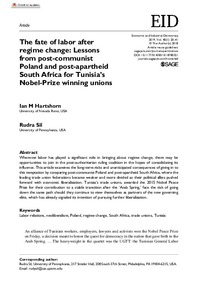The fate of labor after regime change: lessons from post-communist Poland and post-apartheid South Africa for Tunisia's Nobel-Prize winning unions

Economic and Industrial Democracy
2019
40
1
February
20-41
labour relations ; politics ; trade union ; trade unionization
Trade unionism
http://dx.doi.org/10.1177/0143831X18780321
English
Bibliogr.
"Wherever labor has played a significant role in bringing about regime change, there may be opportunities to join in the post-authoritarian ruling coalition in the hopes of consolidating its influence. This article examines the long-term risks and unanticipated consequences of giving in to this temptation by comparing post-communist Poland and post-apartheid South Africa, where the leading trade union federations became weaker and more divided as their political allies pushed forward with economic liberalization. Tunisia's trade unions, awarded the 2015 Nobel Peace Prize for their contribution to a stable transition after the ‘Arab Spring,' face the risk of going down the same path should they continue to view themselves as partners of the new governing elite, which has already signaled its intention of pursuing further liberalization. "
Digital
The ETUI is co-funded by the European Union. Views and opinions expressed are however those of the author(s) only and do not necessarily reflect those of the European Union or the ETUI.